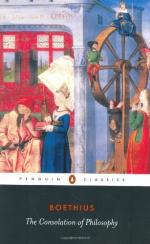
|
| Name: _________________________ | Period: ___________________ |
This test consists of 5 multiple choice questions, 5 short answer questions, and 10 short essay questions.
Multiple Choice Questions
1. What is Boethius' answer after the woman asks what ails him?
(a) That what ails him is obvious.
(b) That he can't escape.
(c) That his sons won't visit him.
(d) That his wife left him.
2. What does Philosophy say could be wrong with a man of good reputation in her example about not being able to be truly happy?
(a) He might not be rich.
(b) He might be ugly.
(c) He might not have a good domestic life.
(d) He might not know God.
3. Who does Philosophy say Boethius cherishes?
(a) His family.
(b) His friends.
(c) God.
(d) His peers.
4. Why does Philosophy say no-one can truly be happy in life?
(a) Because being fulfilled is arrogant.
(b) God doesn't want happiness in this life for man.
(c) Because something is always missing.
(d) Men are too greedy.
5. What was Boethius usually studying?
(a) Various religions of the world.
(b) Thermodynamics.
(c) Perfect forms of government.
(d) Magnetism.
Short Answer Questions
1. What gift did God give to men according to Boethius?
2. Who is the woman in the cell with Boethius?
3. What does Lady Philosophy qualify herself as a doctor of?
4. What does Philosophy tell Boethius not do while she exposes her arguments in Book II?
5. What is Boethius' first thought on why the woman came in his cell?
Short Essay Questions
1. Why does Boethius disagree with the woman regarding misery and what is her rebuttal?
2. Based on the woman's argument, why are material goods inherently valueless?
3. Why does the woman praise Boethius' former way of life in comparison to his present situation?
4. What does the woman remind Boethius of in regards to the events and his attitude?
5. Who does the woman liken Boethius to and why?
6. What is significant about the clothing worn by the woman who enters Boethius' cell?
7. What is the discussion in regards to fame and high office and why is this important?
8. Why is the way that the woman describes Boethius' achievement in comparison to the world significant?
9. Why does the woman urge Boethius to break his silence?
10. What diagnosis does the Lady Philosophy make and what does she point out at the beginning of Book II?
|
This section contains 887 words (approx. 3 pages at 300 words per page) |

|




